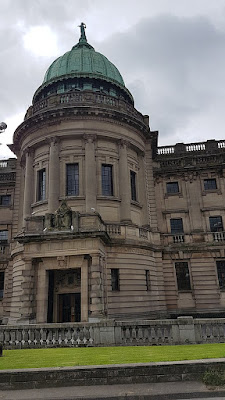 |
| Argus, Melbourne, 19 Jul 1950 |
Last week I posted a bit about my grandfather and the kind
of fellow he turned out to be. This
week, after a 45-year wait I bring you news of his brother Duncan. Previously all that had been known about him
after departing Glasgow was that he had emigrated to Australia. No further word about him reached my mother’s
family.
Yesterday, an e-mail alert from MyHeritage which had been
languishing unread in my inbox for several weeks revealed some suggestions for
records about various men named Duncan Paul. Most of them seemed to be from
American city directories, and I was about to delete the e-mail when the birth
date of my great-uncle jumped off the screen.
Sure enough, he had ended up in Australia, and one of his relatives
there had posted his information on the website. From it I gleaned a fair bit of interesting
detail, which makes up much of the following story.
Duncan, my mum’s uncle, was born in 1914 in Glasgow, and
married Elizabeth there just after the outbreak of World War 2. He was involved in military service and seems
to have been posted to the south coast of England because it was in Southampton,
about 1946, that he met a lady called Ivy.
Ivy was a recently-widowed mother of five. Her husband Charles had been a steward in the
merchant navy but died in September 1945 and is commemorated in a war grave. Ivy and Duncan had a child together, and then in 1949 she left with the children for Australia.
 |
| Cameronia (Marxchivist from USA on Flickr, CC BY 2.0, via Wikimedia Commons) |
Duncan also applied to emigrate, and in 1950 had been accepted when, during a spell working on Southampton dock, he got itchy feet. The ship Cameronia berthed and he learned that it was bound for Australia, so on the night before it sailed he packed three suitcases and brazenly marched aboard, his confidence fooling crew and passengers alike. However, after five days without food he surrendered himself to the captain, who appears to have taken pity on the stowaway and allowed him to work the remainder of his passage.
When the ship docked at Colombo in present-day Sri Lanka,
Duncan sent a telegram to Ivy to let her know he was on his way. She was his sponsor for the purposes of
emigration and when the Cameronia arrived in Melbourne she was there on the
quay to greet him. Australian newspapers
carried the story of the “Scottish stowaway” and printed the photograph at the beginning of this post, along with a physical description of Duncan as being freckle-faced, red haired and slightly built.
But what of his wife Elizabeth back in Glasgow? This is where the Australian newspaper account is silent, but records show that it was not until 1952 that she obtained a divorce from Duncan. His address on the legal documents was "unknown", so as yet it's not clear if Duncan ever knew he was divorced, nor if he married Ivy.
But really, never give up on a search for a relative, no matter how long you've been looking!



